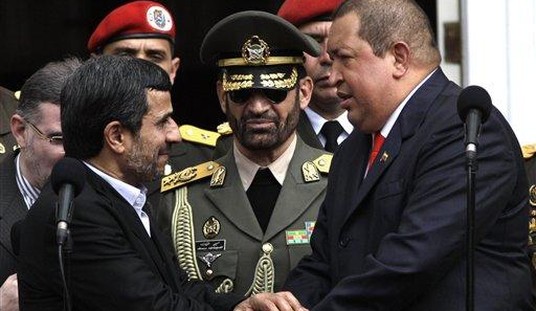Barack Obama began — in fits and starts — to alter his stance on Iraq. It followed Obama’s movement on a host of issues including FISA extension/immunity for telecom companies, NAFTA, public campaign financing, participation in town hall meetings, gay marriage, the payroll tax cap, and the Second Amendment. But this is his biggest reversal to date, both because of the magnitude of the issue and because it was a focal point of his primary campaign run.
On July 3 Obama offered up this:
My 16-month timeline, if you examine everything that I’ve said, was always premised on making sure that our troops were safe. I said that based on the information that we had received from our commanders that one to two brigades a month could be pulled out safely, from a logistical perspective. My guiding approach continues to be that we’ve got to make sure that our troops are safe and that Iraq is stable. I’m going to continue to gather information to find out whether those conditions still hold.
When that set off a media buzz, suggesting that Obama was finally abandoning his insistence on withdrawing a brigade or two a month, he retreated. He called a second presser to assure his base and the media that nothing was changing and he was “not searching for maneuvering room.” Nevertheless, pundits and the McCain team went into overdrive, sensing that the moment had finally come when Obama was throwing his retreat-at-all-costs policy overboard. Some conservatives praised him for belatedly getting on board with an eighteen-month-old surge policy that had changed the landscape in Iraq and made a successful outcome possible.
But by Saturday, July 5, Obama was having second and third thoughts. He claimed to have been himself “puzzled” that anyone could have thought his Thursday comment a signal he was changing course and declared: “I don’t think in anyway it is inconsistent with prior statements and doesn’t change my strategic view that this war has to end and that I am going to end it as president.”
Then last week he was reduced to pleading that he had not in fact changed position on Iraq or other topics. Although he hinted at a more flexible timetable in an interview with the Military Times, when before partisan audiences he reverted to his previous standard-fare language on an unequivocal withdrawal of troops in 16 months.
And now this week in the New York Times he attempted to set out his new policy. As Churchill said of Russia, “It is a riddle, wrapped in a mystery, inside an enigma.” He seems to acknowledge a downturn in violence yet is silent on the efficacy of the surge and of the political and military advances which the surge made possible. The 16-month withdrawal schedule is still there, but he now openly talks of a “residual force” which will remain. How large and for how long (Is it the 100 years for which he derided McCain?) we don’t know. If not moving to embrace the McCain surge he clearly is scooting away from his hard and fast withdrawal pledge — the very position which gained him the netroots’ support in the primary.
This was followed by a speech in which he doubled down on his assertion that Iraq was a mere “distraction” in the war on terror, a position that would calm his base which always asserted Iraq was a foolish lark by George W. Bush. That Iraq has now become a battleground, and a successful one at that, against al-Qaeda need not concern Obama, who must be wary of rattling his supporters with too much new information. Then, of course, he had to “purge” his own website, inserting just the type of wiggle-room language which would have brought howls of protest during the primary.
All the hemming and hawing should not be surprising. On one hand, Obama needs desperately to shift his Iraq policy so as not to appear entirely oblivious about the dramatic political and military advances that have occurred — which are now recognized by a variety of mainstream media sources and independent experts. However, he has spent his entire presidential campaign up to this point playing to the netroot gallery and promising to end the war no matter what.
And staunch opponents of the war on the Left have good reason to be upset if Obama throws his position under the proverbial bus. In January 2007 he introduced legislation to cut off funding for troops immediately, not just follow a phased draw-down, and for over a year his website has declared (and still says) without qualification: “Obama will immediately begin to remove our troops from Iraq. He will remove one to two combat brigades each month, and have all of our combat brigades out of Iraq within 16 months.”
Obama again and again, long after the surge was bearing fruit, repeated his refrain that the war must end. Under questioning in a debate in April he reiterated that although he would listen to the commanders he was going to be giving out new orders: get out of Iraq. In his last interview with Tim Russert in May there was this exchange:
MR. RUSSERT: The U.S. ambassador to Iraq, Ryan Crocker, said that a quick withdrawal of U.S. troops from Iraq could result in genocide. Would you factor that in? And if that began to emerge as an issue, would you stop the withdrawal?
SEN. OBAMA: Tim, I would — of course I would factor in the possibilities of genocide, and I factored it in when I said that I would begin a phased withdrawal. What we’ve talked about is a very deliberate and, and prudent approach to the withdrawal, one to two brigades per month. At that pace it would take about 16 months. Assuming that George Bush is not going to lower troop levels before the next president takes office, we’re talking about potentially two years away. At that point we will have been in Iraq seven years. If we cannot get the Iraqis to stand up in seven years, we’re not going to get them to stand up in 14 or 28 or 56 years. [emphasis added]
Moreover, the role of Iraq in the outcome of the Democratic primary cannot be overestimated. For months and months he beat Hillary Clinton over the head with her original vote in favor of the war, declaring only he had superior judgment and only he could effectively contrast the position of the Republican candidate. Despite Bill Clinton’s effort to label Obama’s Iraq storyline of superior opposition to the war a “fairytale,” Obama effectively captured the anti-war vote. At every turn Obama assured voters he was the one candidate to get out of Iraq. And when his advisor Samantha Power hinted otherwise, she was summarily dumped.
So if Obama now shifts ground, recognizes the surge has been working (during the very time period he was exhorting the netroot troops), and pledges to now really listen to the commanders on the ground and adopt the McCain formula — stay as long as possible to transition to effective Iraqi political and military control — the netroots would have reason to scream foul. After all, the premise all along of the anti-war cause which he championed has been that we have no dog in the Iraqi fight and the war is already lost (or will be again as soon as we leave).
But if Obama is now poised to get on board the McCain surge express, what was his entire campaign really all about? Was he just playing with the anti-war base’s emotions, realizing that after the nomination he could realign himself with reality and abandon the anti-war base which gave him the nomination?
This is why, of course, Obama’s move to embrace the surge is so half-hearted and inarticulate. For a fellow who is so adept with words he certainly is having a hard time making himself understood. But that fuzziness is certainly intentional. If he comes right out and says that the war is not lost and he is committed to a successful outcome, the netroot base could well conclude that they have been had. And they would be right.









Join the conversation as a VIP Member